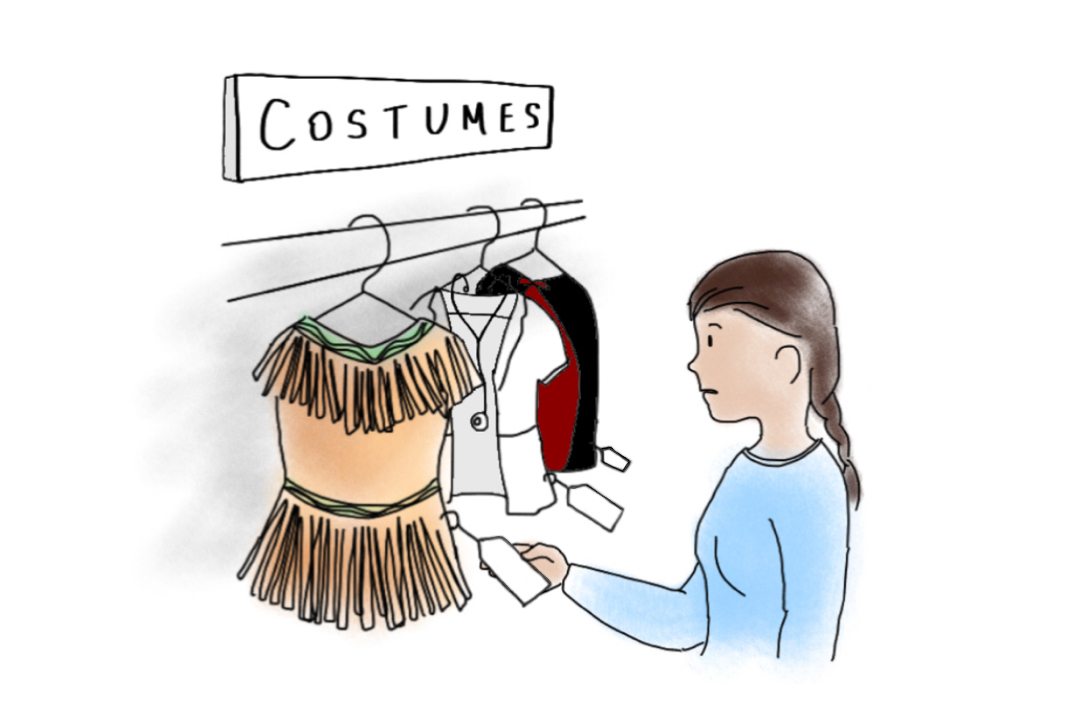Content warning: This article contains discussions of anti-Indigenous racism.
Every year, Halloween costumes seem to spur on debates about cultural appropriation. At a time when we are encouraged to dress up as something we are not, the distinction between definitive appropriation and cultural appreciation can be difficult to navigate. However, while cultural appropriation stemming from a place of ignorance often perpetuates racist stereotypes, the respectful practice of sharing culture is necessary for unifying different peoples.
There are definitely costumes that are considered to be safe from cultural appropriation, like cats or witches. The grey area begins when someone decides to dress up as someone of a different race or cultural background than themselves. The issue can be further compounded depending on whether you’re dressing up as a real person or a character. Furthermore, some people don’t adequately consider why they even feel the need to dress up in a particular costume even if they know it could potentially harm another person. Long story short, there are a lot of questions to consider, and their answers are not always simple.
What is cultural appropriation?
Cultural appropriation is defined as the unacknowledged adoption of creative or artistic themes, customs, or traditions from a minoritized demographic. Often, this appropriation is done by a person or group who experiences a life with more systemic advantages than the people whose culture they are appropriating. Usually, white people in Western societies are the ones stealing from minoritized groups, primarily with the intention of exploiting their culture for aesthetic purposes without permission.
Cultural appropriation can reflect racism and oppression. By trivializing the systemic oppression and hardships faced by minoritized groups, cultural appropriation forces them to relive their collective trauma. Cultural appropriation also devalues the history of minoritized groups for the sake of an aesthetic. This cultural appropriation is most commonly done on Halloween through the costumes that privileged communities choose to wear. Therefore, your costume requires research and thoughtful consideration because a simple outfit could — even unbeknownst to you — cause others immense trauma.
Dressing up as a real person from a different ethnic background is an easy ‘no,’ as it feeds into dated stereotypes. It should be completely avoided. When choosing a real-life person to dress up as, think about whether you would be okay with carrying the weight of the centuries of oppression that the group of people behind your costume have endured.
One recurring theme on Halloween, other than terror and horror, is entitlement — like when a white person feels a raging impulse to dress up as a stereotype of an Indigenous person and proudly call it a costume. Not only does this particular costume dehumanize Indigenous peoples, but it is also a visual beacon of a historically violent past of displacement and genocide.
The problem of fictional characters
Where the grey area begins is when it comes to characters from movies, TV shows, books, comics, or even video games. A prime example can be taken from the 2016 Disney film Moana. The costume for Maui, a character of Polynesian descent, was pulled from stores following backlash from the Polynesian community — and rightfully so. The costume included a brown zip-up suit covered in traditional Polynesian tribal tattoos as well as an attached leaf skirt and a black wig. Some took to Twitter to express their disdain for the appropriation of Polynesian culture, citing the Maui costume as an act of brownface.
However, Hawaiian actress Auli’i Cravalho, who voiced the title character Moana, encouraged children of all ethnicities to dress up as Moana, saying that she thinks it is “absolutely appropriate” for “the little ones who just want to dress up as their favourite heroine.” Not everyone from the same minoritized group is going to be okay with a person of a dominant social group adopting their culture for Halloween, even when it comes to fictional characters, because people can experience and respond to the same event differently.
These divisions spark an important debate as to what constitutes cultural appropriation as opposed to cultural appreciation. While appropriation is extremely harmful and dehumanizing, cultural appreciation — listening and learning about cultures different from your own in a sincere attempt to gain new knowledge — is essential for the collective growth of humanity.
Sharing culture is essential, but stealing is a violation. So be intentional with your Halloween costume this year — and if you have any doubts about it, just reach for those cat ears in the back of your closet, and have a safe night.
Paden Neundorf is a third-year English and equity studies student at Woodsworth College.


